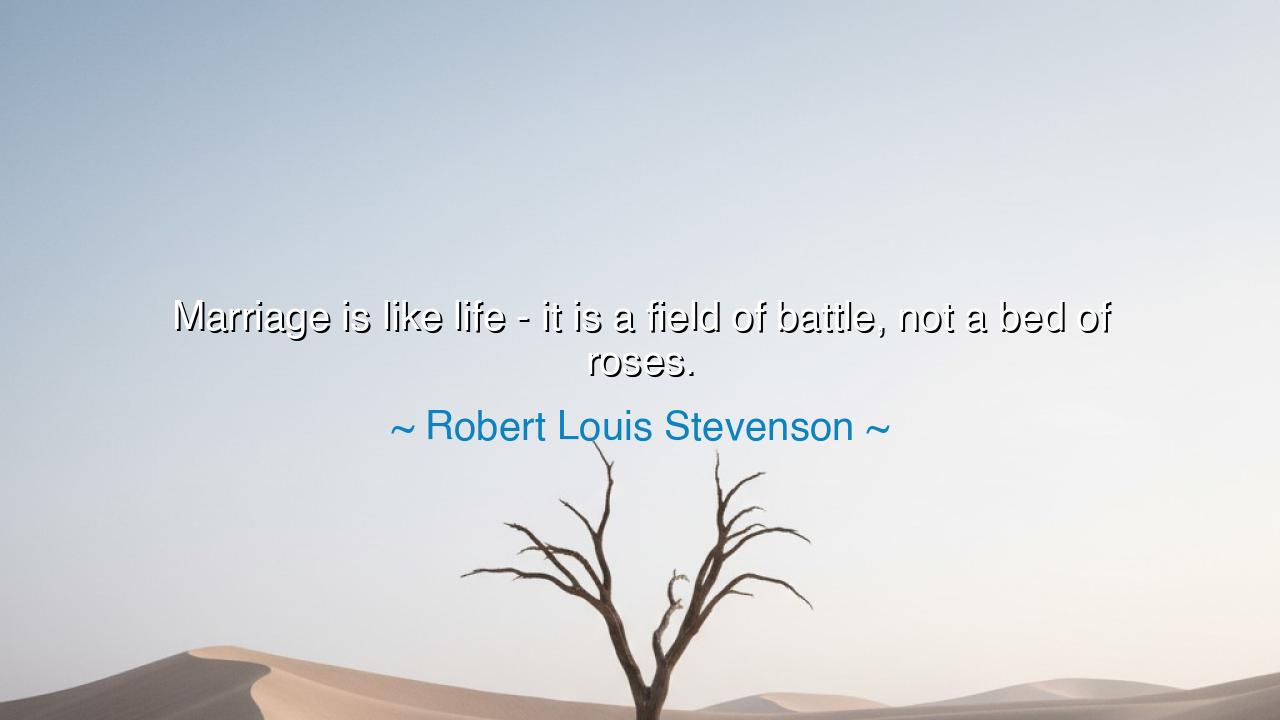
Marriage is like life - it is a field of battle, not a bed of






In the words of Robert Louis Stevenson: “Marriage is like life – it is a field of battle, not a bed of roses.” These words are forged in the fire of truth, glowing with the wisdom of one who knew the storms and sweetness of the human heart. Stevenson, the wanderer and poet, did not speak of war as destruction, but as the noble struggle that gives meaning to our days. For just as life demands courage, sacrifice, and steadfastness, so too does marriage—that most intimate of unions—demand the valor of the spirit.
Too often do lovers dream that love is an endless spring, a place of rest where all pain dissolves. But the wise know that love is not the end of striving—it is the beginning of the greatest endeavor. In the glow of first affection, the heart believes all will be gentle. Yet time, with its trials and tempests, reveals the truth: to remain together through hardship, to choose one another even when joy fades and tempers rise, is to fight the noblest of battles. This is the battlefield of marriage—not of weapons or wounds, but of patience, understanding, and endurance.
Stevenson himself lived these words. His marriage to Fanny Osbourne was not born of comfort or ease, but of courage. She was a divorced woman, older than he, with children of her own. Against society’s disapproval, against sickness, poverty, and distance, they fought for their love. Stevenson, ill and often frail, journeyed across oceans to be with her. Together they endured years of exile, wandering from Europe to the islands of Samoa. Theirs was no bed of roses—it was a field of struggle, watered by tears, yet radiant with loyalty. And it was in that crucible of hardship that their love became something eternal.
Marriage, like life, tests the soul. The passions of youth fade; the illusions of perfection crumble; yet something deeper is forged in their place—a bond of resolve and devotion. The true lovers are not those who never quarrel, but those who, after each quarrel, return to the same hearth and choose again to build. Each day is a new battle against pride, against weariness, against selfishness—and each victory, however small, becomes a triumph of the heart.
Let us not, then, fear the struggle. For roses bloom only where the soil is torn and tilled. The field of battle is also the field of growth. Through labor and sacrifice, through laughter and sorrow, the soul of each partner is refined. In the clash of wills, we learn humility; in the ache of misunderstanding, we learn compassion. It is in the daily combat of love that we discover who we truly are—and what we are capable of giving.
Consider the tale of Odysseus and Penelope, ancient symbols of faithfulness and endurance. Twenty years apart, beset by war and temptation, they held fast to one another. Penelope wove by day and unwove by night, guarding her heart against despair. Odysseus fought monsters and storms, longing for the light of home. When at last they stood together again, their reunion was not the bliss of youth, but the victory of perseverance. That is what Stevenson meant: love is not the absence of struggle, but its most sacred form.
So remember this, children of the future: do not seek only the comfort of roses, for their fragrance fades. Seek instead the strength to fight with honor and to love without retreat. When anger rises, answer it with patience. When silence grows heavy, speak with kindness. When the path darkens, take your beloved’s hand and walk forward together. For in the end, victory does not belong to those who never falter—it belongs to those who rise again, side by side.
Thus, the lesson stands eternal: Marriage, like life, is not meant to be easy—it is meant to be worthy. The roses are not given; they are earned through battle. And in the hearts of those who dare to fight for love, they bloom forever.






AAdministratorAdministrator
Welcome, honored guests. Please leave a comment, we will respond soon